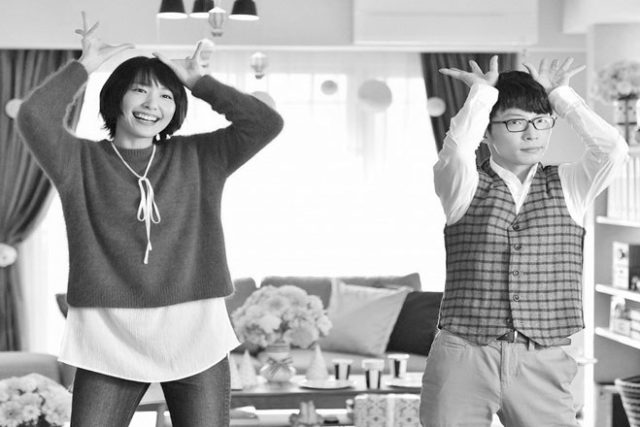By David Yamaguchi
SINCE THE 2016 ELECTIONS, I have been more tuned into the daily news than usual. For people of my turning-sixty, post-Vietnam War vintage, this is probably the first time in our lives that we have had to look at ourselves in the mirror and ask where our values lie. Moreover, it is new for us to see with our own eyes and ears events that until now we have only read about affecting the lives of prior generations. Executive Orders. Federal appellate court reversals (in post-WWII Nisei repatriation cases, for example). Recent events have brought to life the political contexts in which these past actions must also have happened.
At the same time, I also find that I need to tune out the gathering clouds for much of each day, a survival technique undoubtedly being adopted by many readers.
How then to put the saved time to productive use?
My vote is for watching the eleven-part Japanese romantic comedy, “Nigeru wa haji da ga yaku ni tatsu,” which aired on TBS TV in Japan during Oct. to Dec. 2016. The title means, “To escape is shameful but useful.” The drama can be viewed on KissAsian.com on whatever internet-device you have or can beg or borrow from grandchildren (a smartphone, an iPad…). That the drama was featured in the Japan Times provides one indication of its broad cultural significance. An independent measure of the drama’s entertainment value comes from its online viewer count: 784,000 have streamed it online.
The English title, not a direct translation, is “We Married as a Job!” It provides a more concise summary of the storyline. The subtitled saga follows 25-year-old Moriyama Mikuri (Yui Aragaki), who gets laid off from her office job. She thus begins part-time housekeeping, only to find that she starts having romantic feelings for her sole employer, Hiromasa-san, a 35 year-old computer programmer (Gen Hoshino). As her parents, with whom she has been living, shortly thereafter decide to move out of trendy Tokyo to the country owing to her father’s retirement, the young pair decide to form a “contract marriage,” so she can remain in the city. She essentially exchanges housework for a roof over her head.
While the shonen manga (young girl’s manga) storyline is flaky—maintaining a one-bedroom apartment, grocery shopping, and cooking for two are not a full-time job—what makes it work are its irresistible cast of characters.
Ms. Aragaki is able to express much with her face, without need for words. Her nerdy employer-husband is in real life an up-and-coming pop musician in Japan. He sings the catchy theme- song, “Koi” [Love]. How fun it must have been for him to play an emotionless automaton! How amusing it must have been for young Japanese viewers, in on the joke.
The perfect casting extends to the supporting cast, all representing “types” we all know. There is the attractive career-track aunt who can’t find a boyfriend, nor admit that she is a generation older than her niece. There are the funny workmates of the young man, who include a thirty-something bachelor too handsome for his own good, and an offbeat older gay man. Their sole purpose in living is to discern the nature of the sudden relationship of their socially inept colleague.
Throughout, the plot uses the device of the heroine having studied clinical psychology in graduate school. Accordingly, she is always applying her training to try to understand the human behavior around her. Her regular thoughtful soliloquies into the state of her life are presented creatively, as dream sequences spliced into the main story.
Truly outstanding is the way that the drama repeatedly turns on a dime from light romantic comedy to real-life issues: the way parents feel about a daughter getting married; honest father-son conversations; frank discussions between members of a new couple feeling their way forward.
The charming ending dance with which each episode wraps provides icing on the cake. It was so popular in Japan last fall that U.S. ambassador Caroline Kennedy and her staff danced it online in a Christmas goodwill gesture to the Japanese people that went viral. Over seven million have viewed their dance on YouTube.
Alas, it would be Ms. Kennedy’s last dance, owing to the change in U.S. administrations, and a decree from the new king that all diplomats must depart immediately, irrespective of whether or not they have kids in school. In her farewell to Japan, also on YouTube, she is a picture of serenity, humility, and grace. All are words which we are unlikely to need much across the next forty-seven months.
Accordingly, please join me in tuning out and tuning up on the trendy and psychological Japanese vocabulary of “Nigeru wa haji” (e.g., “Kabe-don” [see YouTube], jisan-kanjou [self-esteem], and mousou [delusion]). Accompany me in seeing the extent to which English words have crept into current Japanese conversation (“passion,” “technique,” and “respect”). Escape with me in reflecting on what life is really about.







